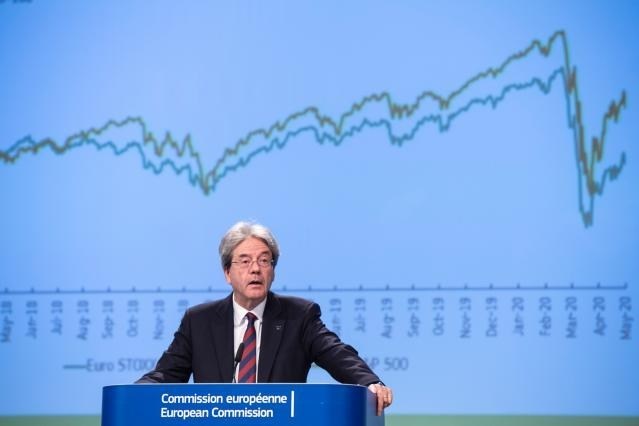The coronavirus crisis represents a major shock for the global and EU economies, with very severe socio-economic consequences. The European Commission foresees that the EU economy will experience a recession of historic proportions this year.
The Commission presented the Spring 2020 Economic Forecast on Wednesday (6 May). The EU economy is forecast to contract by 7.5% in 2020 and grow by around 6% in 2021. Growth projections for the EU and euro area have been revised down by around nine percentage points compared to the forecast last Autumn.
If ordinary citizens have not understood how the economy works in normal times and how all economic functions are interdependent, they learned a bitter lesson during the lockdown, when most economic functions were shut down, affecting wages, labour markets, consumption, sales, services, production and investments.
The Commission underlines that the shock to the EU economy is symmetric since the pandemic has hit all Member States but both the drop in output in 2020 and the strength of the rebound in 2021 are set to differ markedly between them.
Each Member State's economic recovery will depend not only on the evolution of the pandemic in that country, but also on the structure of their economies and their capacity to respond with stabilising policies. Given the interdependence of EU economies, the dynamics of the recovery in each Member State will also affect the strength of the recovery of other Member States.
“Europe is experiencing an economic shock without precedent since the Great Depression,” said Paolo Gentiloni, Commissioner for the Economy. “Both the depth of the recession and the strength of recovery will be uneven, conditioned by the speed at which lockdowns can be lifted, the importance of services like tourism in each economy and by each country's financial resources.”
“Such divergence poses a threat to the single market and the euro area - yet it can be mitigated through decisive, joint European action. We must rise to this challenge,” he added.
The EU economy is not expected to have fully made up for this year's losses by the end of 2021. Investment will remain subdued and the labour market will not have completely recovered.
Increase in unemployment
While short-time work schemes, wage subsidies and support for businesses should help to limit job losses, the coronavirus pandemic will have a severe impact on the labour market, according to the forecast. In the EU, the average unemployment rate is forecast to rise from 6.7% in 2019 to 9% in 2020 and then fall to around 8% in 2021.
Some Member States will see more significant increases in unemployment than others and the rate could reach up 20 %. Those with a high proportion of workers on short-term contracts and those where a large proportion of the workforce depend on tourism are particularly vulnerable. Young people entering the workforce at this time will also find it harder to secure their first job.
Consumer prices are expected to fall significantly this year due to the drop in demand and the steep fall in oil prices, which together should more than offset isolated price increases caused by pandemic-related supply disruptions. Inflation in the EU is forecast at 0.6% in 2020 and 1.3% in 2021.
Member States have reacted with fiscal measures to limit the economic damage caused by the pandemic. The extra spending is expected to cause the aggregate government deficit in the EU to surge from just 0.6% of GDP in 2019 to around 8½% in 2020, before falling back to around 3½% in 2021.
After having been on a declining trend since 2014, the public debt-to-GDP ratio is also set to rise from 79.4% in 2019 to around 95% this year before decreasing to 92% next year.
High uncertainty
The Commission warns that the forecast is clouded by a higher than usual degree of uncertainty because it is based on a set of assumptions about the evolution of the coronavirus. The forecast baseline assumes that lockdowns will be gradually lifted from May onwards but if the restrictions will have to be reversed, the economy will not recover as planned.
In the absence of a strong and timely common recovery strategy at EU level, there is a risk that the crisis could lead to severe distortions within the Single Market and to entrenched economic, financial and social divergences between Member States.
Another issue is the impact of the crisis on globalisation which has driven the international economy until now. Will the crisis result in changes in consumption patterns and a backlash against globalisation? There is a risk, according to the forecast, that the pandemic could trigger more drastic and permanent changes in attitudes towards global value chains and international cooperation, which would weigh on the highly open and interconnected European economy.
The threat of tariffs following the end of the transition period between the EU and United Kingdom could also dampen growth, albeit to a lesser extent in the EU than in the UK.
The Brussels Times

